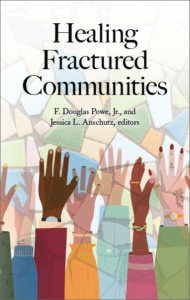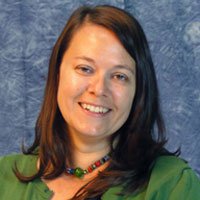

“How can congregational leaders be both healers and agitators at the same time?” That “both/and” question is one of many addressed empirically in the new book Healing Fractured Communities (2024), by F. Douglas Powe and Jessica L Anschutz. The Eastern PA Conference Congregational Development Team will host Anschutz for a four-week, one-hour conversation in July about this helpful new resource for church leaders. Join them for the book study via Zoom on Wednesdays—July 10, 17, 24 and 31—at 11 a.m. to 12 p.m. Register

Dr. Anschutz, an ordained United Methodist elder and assistant director of the Lewis Center for Church Leadership, is co-editor of the Center’s Leading Ideas publication and teaches in Wesley Theological Seminary’s Doctor of Ministry program. Dr. Powe, who directs the Lewis Center, is a distinguished at Wesley and coauthor with Lovett H. Weems Jr. of Sustaining While Disrupting: The Challenge of Congregational Innovation (Fortress, 2022). His previous books include The Adept Church: Navigating Between a Rock and a Hard Place (Abingdon Press, 2020); Not Safe for Church: Ten Commandments for Reaching New Generations; New Wine, New Wineskins: How African American Congregations Can Reach New Generations; Transforming Evangelism: The Wesleyan Way of Sharing Faith; and Transforming Community: The Wesleyan Way to Missional Congregations.
Congregational leaders are charged with caring for those inside and outside of faith communities. The care required is not only personal but involves dealing with deeply rooted fractures within the community. Fractures like racism, education inequality and poverty, to name a few, plague those inside and outside of the church. Given our fractured landscape and the diversity of contexts where congregations exist, “How can congregational leaders be both healers and agitators at the same time?”
The danger of simply being a healer ignores the underlying causes of the fracture(s) in a community. The danger of simply being an agitator is others ignore you because your voice is monotone. Being a leader who lives in this tension inside a faith community and the public square requires nimbleness—a nimbleness that allows for being an ointment and an irritant when needed.
Each chapter of Healing Fractured Communities is written by a pastoral leader engaged in the work of renewal, resilience, and resistance in congregations, on college campuses and in communities. One of those pastors is the Rev. Iraida Ruiz De Porras, pastor of Butler (NJ) UMC, who also chairs the Greater New Jersey Conference’s Connectional Table (until July 1). Each chapter paints a picture of the work of healing, while including questions for reflection and helpful takeaways.
“Healing Fractured Communities offers rich and powerful real-life stories and perspectives from influential transformational leaders that reveal crucial and transferable values and principles that drive congregational and community renewal in today’s mission field,” writes Bishop Héctor A. Burgos Núñez, who leads the UMC’s Upper New York Conference. “This book is an excellent resource for pastors and congregational leaders who desire to spark their imagination and expand missional possibilities that will help turn their ministries outward into the community to make the healing love of Christ visible in the world.”
